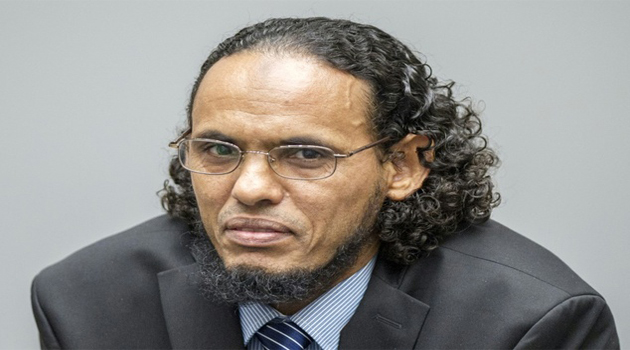
Alleged Al-Qaeda-linked Islamist leader Ahmad Al Faqi Al Mahdi pleaded guilty to a single charge of cultural destruction at the International Criminal Court in The Hague on August 22, 2016/AFP/ANP
THE HAGUE, Netherlands, Aug 22 – A Malian jihadist sought forgiveness as he pleaded guilty Monday to the 2012 attacks on the fabled city of Timbuktu, and urged Muslims not to follow such “evil” ways at his unprecedented war crimes trial.
“Your honour, regrettably I have to say that what I heard so far is accurate and reflects the events. I plead guilty,” Ahmad al-Faqi al-Mahdi said, becoming the first person to confess to the International Criminal Court, admitting the solo war crimes charge of cultural destruction.
Mahdi, aged about 40, is also the first Islamic extremist charged by the ICC, and the first charged with crimes arising out of the conflict in Mali.
The razing of the ancient shrines by jihadists triggered global outcry, and archaeologists hope the trial will send a stern warning that such plundering of our common heritage will not go unpunished.
The bespectacled Mahdi is accused of “intentionally directing attacks” against nine of Timbuktu’s famous mausoleums as well as the Sidi Yahia mosque between June 30 and July 11, 2012.
Founded between the fifth and the 12th centuries by Tuareg tribes, Timbuktu’s very name evokes centuries of history and has been dubbed “the city of 333 saints” for the number of Muslim sages buried there.
Revered as a centre of Islamic learning during its golden age in the 15th and 16th centuries and a designated UNESCO world heritage site, Timbuktu was however condemned as idolatrous by the jihadists.
Begs ancestors’ pardon
ICC prosecutors allege that Mahdi was a member of Ansar Dine, a mainly Tuareg movement that in 2012 took control of Timbuktu some 1,000 kilometres (600 miles) northeast of Bamako, along with Al-Qaeda in the Islamic Maghreb (AQIM).
Mahdi told the tribunal, based in The Hague, that he regretted the damage he had caused and was “really sorry”.
“I would like to seek the pardon of all the whole people of Timbuktu,” he said, adding he also begged forgiveness from “the ancestors of the mausoleums I have destroyed.”
Vowing he would never carry out such actions again, he sought to distance himself from the jihadists describing their acts as “evil.”
“It is also my hope that the years I will spend in prison will be a source of purging the evil spirits that had overtaken me,” he told the court.
As the head of the “Hisbah” or the “Manners Brigade” he had ordered the shrines to be destroyed, ICC prosecutors say.
Such “deliberate attacks on cultural property have become actual weapons of war,” ICC chief prosecutor Fatou Bensouda told the court.
“It was a period in time that was one of destructive rage. The heritage of mankind was ransacked,” she said.
The jihadists “wanted to destroy these monuments and simply wipe them off the map,” she said, urging the court “to stand firm in our resolve to end impunity for such serious crimes.”
The prosecution said it would present to the court during the five-day hearing a video of Mahdi attacking the shrines himself with a pick-axe.
Ancient rites
The judgement will follow later, but it was revealed the defence and prosecution have struck a deal under which Mahdi would not appeal a jail term of between nine to 11 years.
The judges warned however the court is not bound by the deal, and he could face up to 30 years imprisonment.
Mahdi has been described as a quiet Koranic scholar who turned ruthless jihadist enforcer, fiercely imposing the strictest interpretation of Sharia law.
Frustrated when local people refused to stop worshipping at the ancient shrines, with such rites as praying for rain or a good marriage, Mahdi ordered the attacks with pickaxes, chisels and pick-up trucks and “even a bulldozer”.
UNESCO chief Irina Bokova said recently the case was close to her heart and that she “would never forget” the scenes of ransacked and damaged shrines she saw on a visit to Timbuktu in January 2013 shortly after the jihadists had been driven out by a French-led operation.









































